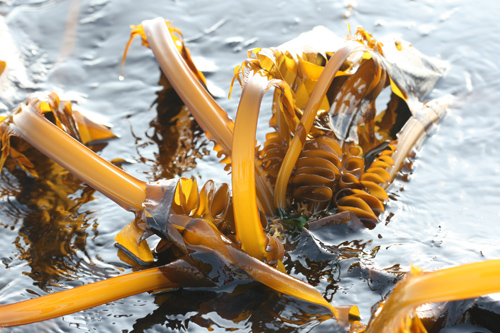A new Undaria variety “Haibao No.1” has been successfully bred and cultivated by the Institute of Oceanology, Chinese Academy of Sciences (Marine algal culture collection centre, Dr. Shao Jun Pang’s research team) and Dalian Haibao Fishery Company Ltd. at Lvshun, Dalian city, Liaoning province. This special variety is characterized with larger blade, higher productivity and better taste. It is bred by line breeding combined with 4-generation’s targeted selection. The productivity of this unique strain is 30% more than that of the conventional harvest. Up to March 1, 2013, the fresh weight of the algal biomass from one 8-meter’s long cultivation rope reached 110 kg.
Undaria pinnatifida (in Chinese called “qun dai cai”)is one of the seven macroalgae that have been historically farmed on longlines in surface waters for human consumption. This marine “vegetable” has been traditionally treated as a seafood delicacy. Only the rich and the powerful could get access to it in old times when it could only be harvested from the intertidal zone along the coast. Undaria is naturally distributed from Zhejiang province to Liaodong peninsula in China. It has a powerful reproduction potential and thus regarded as one of the dangerous invasion species in some of the regions including Australia, Europe and New Zealand etc. However, the French soon noticed its delicious taste and started to grow it in the sea in the 1980s. Up to today, China, South Korea and Japan are the three countries that have large-scale commercial farming of it. In China, most of the farmed Undaria, after processed (salted or dried), are exported to Japan, Korea and other Asian countries. In recent years, the domestic consumption has started to grow dramatically, especially the processed midrib, because its taste and structure fits the Chinese very well. In Korea, pregnant women must eat Undaria from the sea for delivering a healthy baby, while nearly all the Japanese people are eating this alga or drinking its soup which is called “wakame”. In recent year, due to the excellent quality of alginate acid in Undaria, the alginate extracting companies start to pay attention on buying the biomass of this alga along the Chinese coast, which in turn will facilitate the cultivation of this seaweed in the future.
 |

